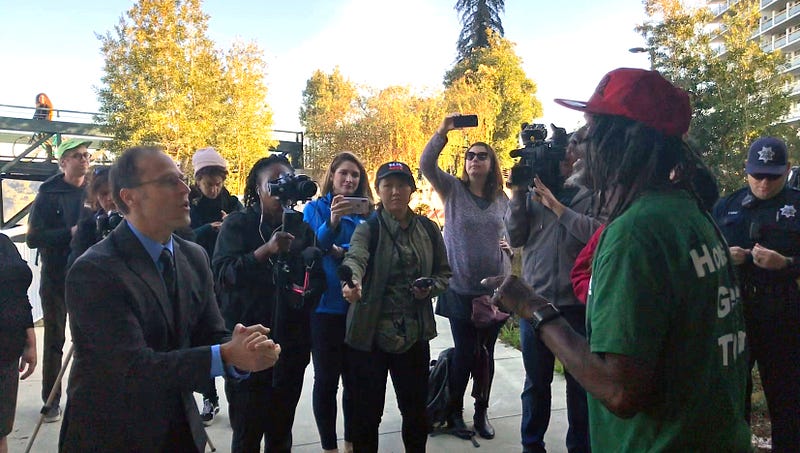Long-standing battle highlighted by dispute between victim and city official
Robert Hinton, Laney Tower Staff Writer

Joe DeVries and Nino Parker agree on one thing — there is a housing crisis in Oakland.
Unfortunately, they don’t agree on how to fix it.
Parker is a homeless resident and activist in Oakland working to petition the city for housing for his fellow homeless residents. He lives at the Lake Merritt estuary and he will be “evicted” from his camp, based on the city’s plans for the public space he and others inhabit.
DeVries is the assistant to the Oakland city administrator. He is responsible for organizing the city’s programs that are attempting to address homelessness, including the “Tuff Shed” program and the cleaning and removal of homeless camps in the city.
DeVries does not like the term “Tuff Shed,” which Parker and activists use to refer to the cabins. Instead, he prefers “community cabins.” DeVries calls the removal of homeless residents from city property “closures,” whereas Parker prefers the term “evictions.” (In this article, the terms will be used interchangeably.)
These different classifications of the issues of homelessness illustrate the divide that separates these people and programs from their vision for combatting homelessness in Oakland and in Alameda County at large.
The city plans to “clean and clear” the camp that Parker lives in Thursday, Nov. 8, according to DeVries.
In addition to petitioning City Hall to invest more funds into housing the homeless, Parker keeps “undesirable” people from taking up residence in his camp at the estuary. Anyone acting violently or abusing drugs is not welcome.
Parker, in his sixties, invites older residents to live in what he refers to as “Camp One,” in an attempt to shield senior homeless residents from abuse and crime.
“There are too many grandmas and grandpas on the streets,” he said.
Parker says he does not want to live in the Tuff Shed sites because people he has chased out of his camp for dangerous behavior now occupy the sheds at Lake Merritt were DeVries would like to relocate Parker.
Parker fears that even if he did move into a Tuff Shed site, his 11-year-old son could not visit him because it would be unsafe for both of them. He fears having a child around people that might be holding a grudge against him.
The need for privacy and space to store belongings is another issue for residents. Two people are housed in each shed and Parker is not willing to live with anyone else. All of his belongings would not fit in the sheds.
DeVries admits that he would like to accommodate Parker’s requests, but there is not enough housing to ensure residents will have their own space, he said.
Currently, three Tuff Shed camps are in operation: Northgate Avenue and 27th Street; Castro Street and Sixth Street; and the parking lot at the Henry J. Kaiser Convention Center directly across from Laney College.
The city opens community cabin sites close to existing homeless camps in order to provide more structured living conditions, social services, and basic sanitation, DeVries said. The cabins have lights, insulation and smoke detectors.
These “cabins” are temporary and the goal is to move residents into permanent housing after an initial stay, which can be as long as six months. The city views these cabins as a safer and more sanitary alternative to residents erecting their own camps.
They have running water, toilets and a place for residents to cook. Residents of the Tuff Shed camps can come and go as they please, but they have to sign in and out and cannot use drugs or alcohol in the camps.
“This is emergency housing. It was never meant to be permanent,” DeVries said.
Each camp can house 40 people. The city census of the homeless camps that were near the Tuff Shed camps counted 101 homeless near the Northgate camp, 45 near the Castro camp, and 72 around Lake Merritt.
Residents evicted from homeless camps near Tuff Shed sites have to find another place to go if the camp is at capacity. Additional shelters are run by the city including the Henry Robinson Multi-Service Center at 559 16th St., which provides emergency shelter and services to the community funded by the city.
Oakland has also purchased a property at 641 Grand Ave that will feature 70 units capable of housing 90 residents, according to the city’s website, but the new building will result in the closure of the Castro Street Tuff Shed site. The Grand Avenue site will open in December.
Three new community cabin sites are being planned as well. The city estimates that 320 people will be housed in these new camps. At a cost of $4.5 million over 18 months in operational costs.
DeVries says the city is trying to remedy the homelessness issue in Oakland, but others favor a more aggressive approach to combating the problem. Parker suggests implementing eminent domain to get more housing for the homeless.
The city’s progress is an encouraging sign, DeVries said, and added that more housing is on the way.
DeVries and Parker both want to see homelessness end in Oakland. The gap that separates their approach is an indication that homelessness is not an issue that can be done away with easily, and the passions involved in combating this issue often pull people apart, despite their common interest.

























